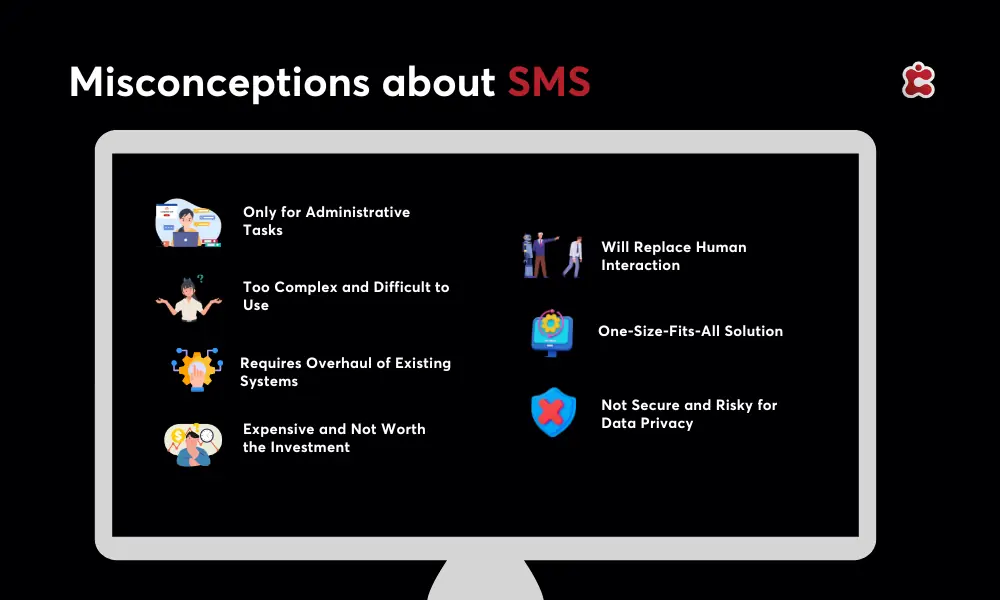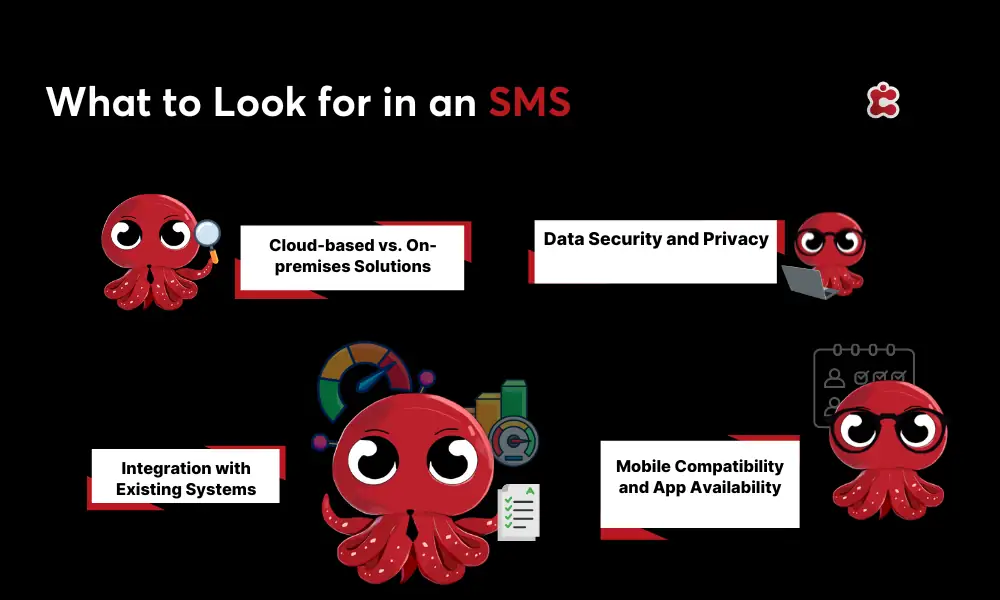Misconceptions are a natural part of adopting new technologies, and School Management Systems (SMS) are no exception. As colleges embrace these advanced tools, it’s easy for misunderstandings to take root about what SMS can really do. We’re here to clear up the confusion and show you the real benefits of these systems.
School Management Systems are designed to simplify and enhance many aspects of college life, from handling administrative tasks to improving communication and streamlining operations. However, despite their potential, a few myths can prevent fully understanding their value.
It’s important to tackle these misconceptions head-on because they can affect how well SMS is used and appreciated. Some might think SMS is only for paperwork or that it’s too complicated to handle. Others worry about the costs or fear it might take away personal touch. By setting the record straight, we want to highlight how SMS can actually integrate smoothly with what you already have.

1. SMS is Only for Administrative Tasks
One of the most common misconceptions about School Management Systems is that they’re just glorified tools for handling paperwork and administrative chores. It’s easy to see why this belief persists—after all, SMS can streamline things like scheduling, grading, and attendance. But limiting SMS to just administrative functions is like saying a smartphone is only good for making calls. There’s so much more to it!
SMS also has student engagement by offering features like online forums, communication channels, and personalized learning experiences. These tools help create a more connected and interactive campus environment, which can lead to better academic outcomes and a more vibrant college community.
2. SMS is Too Complex and Difficult to Use
It’s a common worry that SMS are so complex that they become a source of frustration rather than a helpful tool. With all the features and functionalities they offer, it’s easy to imagine that using an SMS might feel like trying to master a high-tech gadget with a million buttons. But let’s set the record straight: modern SMS platforms are actually designed with user experience in mind.
Think of SMS as a tool that evolves with your needs, not something that adds layers of complexity to your day. Today’s SMS platforms come with intuitive interfaces that are easy to navigate. They’re crafted to be as user-friendly as possible, so you don’t need to be a tech wizard to get the hang of them.
And it’s not just about having a sleek interface. Many SMS providers offer comprehensive training and support to help you and your team get comfortable with the system. This includes everything from hands-on workshops to detailed user guides and responsive customer support teams ready to assist with any questions.
3. SMS Requires a Complete Overhaul of Existing Systems
One major concern when considering a school management system (SMS) is the fear that implementing it means you’ll have to start from scratch with your existing systems and processes. It’s easy to think that a new SMS would require a complete overhaul, disrupting everything you’ve worked hard to set up. But that’s not necessarily the case!
Here’s how SMS can fit into your existing setup:
- Student Information Systems (SIS): Integrates to manage and update student records efficiently.
- Learning Management Systems (LMS): Connects to streamline course management and delivery.
- Email Systems: Syncs to facilitate communication and notifications.
- Financial Systems: Works with accounting software for tuition and fee management.
- Scheduling Software: Integrates to coordinate class schedules and resources.
- Library Management Systems: Connects for managing library resources and borrowing.
- Human Resources Systems: Syncs to manage faculty and staff data.
- Admissions Systems: Works with existing tools to streamline the admissions process.
- Campus Security Systems: Integrates to ensure a secure campus environment.
4. SMS is Expensive and Not Worth the Investment
It’s understandable to worry about costs, especially when budgets are tight. There is a belief there is a hefty investment with little return on an SMS. But here’s the scoop: while the initial expense of an SMS might seem significant, the value it brings can far outweigh the costs.
- Automates routine tasks, which means less manual work and frees up staff to focus on more strategic activities.
- SMS provides insights that help optimize resource use, from scheduling to classroom management.
- Better data handling reduces errors and improves decision-making, which can prevent costly mistakes.
- Faster, more accurate processes lead to better productivity and less wasted time.
- By providing tools for personalized learning and tracking progress, SMS can help improve student performance, which in turn can enhance institutional reputation and attract more students.
5. SMS Will Replace Human Interaction
It’s understandable to be concerned that more technology could mean less face-to-face communication, but SMS is designed to enhance, not replace, human interaction. Imagine SMS as a tool that supports and amplifies how you connect with students and colleagues. Rather than reducing personal interactions, SMS provides platforms and features that make communication more effective and streamlined. For example, SMS can offer secure messaging systems, virtual meeting tools, and discussion forums that complement face-to-face interactions, making it easier to stay in touch and collaborate.
In essence, SMS is here to complement and support your personal connections. It’s about creating a more connected, efficient, and supportive environment where technology works alongside people, not in place of them.

6. SMS is a One-Size-Fits-All Solution
A common myth about SMS is that they are generic tools with no room for customization, making them unsuitable for colleges with unique needs.
In truth, modern SMS platforms are highly adaptable and can be tailored to each institution’s specific requirements. Take Classter, for example. Classter’s SMS is built with flexibility in mind. It offers a range of customizable modules that can be adjusted to fit your college’s specific workflows and requirements. Whether you need specialized features for course management, student engagement, or administrative tasks, Classter can be configured to provide precisely what you need.
Here’s how Classter demonstrates its adaptability:
- Customizable Modules: Choose and configure modules to match your school’s unique processes and goals.
- Scalability: As your institution grows or evolves, Classter can scale and adapt, ensuring you always have the right tools at your disposal.
- Tailored Solutions: Implement features that address your specific challenges and enhance your operational efficiency.
7. SMS is Not Secure and Risky for Data Privacy
With all the sensitive information managed by these systems—student records, financial details, academic progress—it’s natural to worry about how well this data is protected. Rather than being risky, SMS platforms are often more secure than traditional methods of data management. They adhere to stringent compliance standards and utilize advanced technologies to protect against breaches and unauthorized access. It contains features such as data encryption, access controls, regular security audits, and adherence to industry standards and regulations such as GDPR or FERPA.
The goal of an SMS is to enhance efficiency and support educational processes, and that includes taking data security seriously. With these advanced security measures in place, you can trust that your data is handled with the highest level of care. So, while security concerns are valid, modern SMS platforms are designed to provide a safe and secure environment for managing your institution’s information.
FAQ’s
Misconceptions include SMS being solely for administrative tasks, too complex, expensive, or risky for data privacy. These systems are versatile tools that enhance various aspects of college life, from academics to communication.
Modern SMS platforms are designed with user-friendly interfaces and provide comprehensive training and support to ensure ease of use for all staff members.
Classter provides customizable modules and scalable solutions, allowing colleges to tailor the platform to their specific operational needs and goals.

